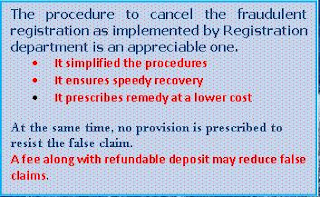 |
| To read the Article for Non-Lawyers, CLICK here |
It is considered that a
cancellation of previously registered deed by executants is against public
policy and also felt that by permitting the registration of cancellation deeds,
the vendors or executants shall misuse the provisions and allowing it would
amount to abuse of process of law.
The only remedy to the aggrieved
party was to approach the competent Civil Court.
It was held by Courts, in relation
to cancellation deed, as follows:
 ·
A deed of cancellation of previous
transfer unilaterally executed by the transferor does not create or extinguish
any right, title or interest in the property and is no effect. Hence, such a
document cannot be registered.
·
A deed of cancellation of previous
transfer unilaterally executed by the transferor does not create or extinguish
any right, title or interest in the property and is no effect. Hence, such a
document cannot be registered.
·
Once title to the property is vested in
the transferee, it cannot be divested unto the transferor by execution and
registration of deed of cancellation even with the consent of the parties. The proper course is to re-convey.
·
A fraudulent transfer can be cancelled
by transferor by obtaining a decree from a Civil Court.
A curative remedy has been made by Registration
department of Tamil Nadu Government which prescribes a procedure regarding
complaints related to fraudulent registration through impersonation or by
producing false documents and evidences.
It is clearly stated in the recital
of the procedure that a normal response of the Registration department to
petitions relating to fraudulent registration is to direct the aggrieved
parties to approach Civil Court. But this reply shall double jeopardize the
petitioners.
Similarly, sections 82 and 83 of
Registration Act provide grounds and quantum of punishment for the offences.
The purpose of these sections is to punish the involved in frauds. However,
mere punitive action shall not suffice and serve the objective of the Act which
aims at elimination of frauds.
Thus a curative remedy is necessary
not only to provide relief to the aggrieved party but also to prevent further
fraud and cheating of innocent future purchasers.
In light of the above, a mandatory
procedure was prescribed which confers power on District Registrar
(Administrations) to make inquiry and to pass orders to annul the fraudulent
registration.
The procedure prescribes that the
aggrieved party shall lodge a complaint to Sub Registrar concerned, who shall
forward the same to District Registrar.
The District Registrar shall issue
notices to the executants(s) and witness(s) of the document challenged as fraud
to appear for an inquiry. Once the inquiry is completed and if it is proved
that the subject registration has taken place through impersonation or false
representation, statements and admissions, the DR shall pass orders to this
effect that the registration is annulled.
The DR shall complete the enquiry
within two months and if the parties are not appearing for two summons,
ex-parte order shall be passed.
In light of the above procedure, it
is advised that the aggrieved party may prepare a detailed petition, preferably
with the help of a property lawyer, giving all the facts and evidences showing
the title of the petitioner and give full details about the fraudulently
registered documents and clearly evidencing the fact of fraud of impersonation,
false representation, admission, etc.
The recital of the petition shall
be precisely prepared so as to enable the authority to form an idea about the
fraud happened. All the relative documents, deeds, patta, EC are to be enclosed
as exhibits which would lead to the right decision at an early stage.
As the DR deals with the cases
specific to the fraudulent registrations alone, the number of cases are less as
compared to that in Civil Courts. As such, a speedy recovery can be expected
and ensured at a cheaper cost.
But at the same time, one shall not
forget that it shall increase the work load of District Registrar and Sub
Registrars too. As the cost of initiating procedure is low, it may result in
increased number of complaints, most of which may become baseless and
worthless.
A fee along with a refundable
deposit amount may reduce the number of false claims. The deposited amount may
be refunded if the claim is proved.
for further reference, suggestion, opinion, visit
To get legal opinion on Title and other aspects, mail to